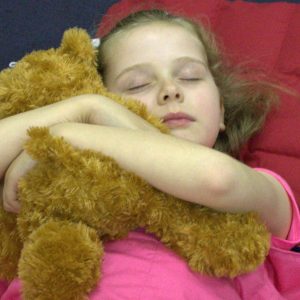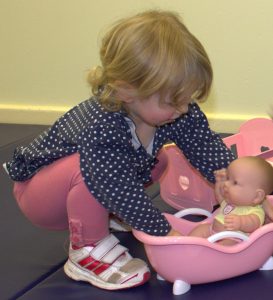 It seems timely, in celebration of National Autism Awareness Month, to devote a blog post to sleep.
It seems timely, in celebration of National Autism Awareness Month, to devote a blog post to sleep.
Parents of children diagnosed with Autism often report that their children have problems with sleep. It’s estimated that over 80% of children who are diagnosed with autism have a combination of sleep disturbances. Up to 40% of typically developing children also have a sleep disturbance.
Sleep has been described in the literature as a neurological process affected by cues from the environment. Therefore, sleep disturbances can arise from interference in this neurological process or difficulties adapting to environmental cues.
Types of sleep difficulties
Children diagnosed with autism experience a range of sleep disturbances, commonly having difficulty with:
- dysfunctional sleep routine (including falling asleep late and waking late)
- falling asleep
- staying asleep (frequent waking)
- obtaining enough sleep
- difficulty rousing in the morning
- sleeping on their own
Sleep is vital for well-being
Sleep is essential to maximise engagement and performance in the activities we need and want to do in our lives. Adequate sleep is particularly important for children, who typically require more sleep than adults. Sleep restores, promotes growth and supports our immune system. It’s also important for physical and emotional health, relationships and overall well-being.
 Impact of sleep difficulties
Impact of sleep difficulties
Sleep difficulties can be a significant concern and are often prioritised in occupational therapy intervention due to the negative impacts on the child and on the well-being of the child’s family.
Inadequate sleep negatively impacts on children’s:
- daytime alertness
- capacity for learning
- daytime behaviour
- ability to cope with sensory input
- ability to regulate emotions
- concentration and attention
- motivation
- ability to follow instructions
- emotional well-being
- ability to cope with challenge or difficulty
- ability to interact with others
- physical activity
- memory
Parents of children who have sleep difficulties often experience similar negative impacts. They also experience high levels of stress.
Helpful strategies
Resolving children’s sleep disturbances requires effort, time and patience. Our occupational therapists can support you to develop an individualised sleep plan and to implement positive sleep practices.
The following strategies are often effective in addressing children’s sleep disturbances (not caused by physical or mental health problems):
 Functional sleep routine and habits
Functional sleep routine and habits
- Regular waking and bedtimes, which are also consistent at weekends
- A bedtime routine with at least 30 minutes of calming activities such as stories, quiet play or gentle songs before sleep time; the last part done in the child’s bed
a relaxing hour before bedtime
- Time outside and exercise during the day (but not too close to bedtime) can help with sleep cycles
- Avoiding large meals before bedtime though a small snack before teeth cleaning may be helpful
- Using a transitional object such as a teddy or blanket
- Giving your child a clear message that it is time to sleep with a hug, kiss, goodnight and then minimal stimulation after this
Ensuring sleep environment is appropriate and supportive of sleep
- A comfortable bed,
- A warm or cool room,
- Quiet and darkness
- It is best if the child can fall asleep where they will stay all night
Visual communication strategies
- Visual schedules
- Visual cues
- Stories
 Sensory approaches that promote relaxation for sleep
Sensory approaches that promote relaxation for sleep
- A calming gentle massage can be helpful
- Reducing noise and light such as from televisions
- Some soothing sensory stimulation such as soft music, a lava lamp, or a calming scented oil may be helpful
- Encouraging self soothing activities
Behavioural strategies
- Camping out,
- Scheduling,
- Bed time fading,
- Daytime sleep restriction, by reducing or altering daytime naps
Other things to consider:
- Avoiding foods and drinks with caffeine such as chocolate for six hours before bed
- A balanced diet with protein, vitamins (B3, B12, folic acid) and minerals (iron, calcium, magnesium) can help with sleeping
- Checking with your doctor that there are no medical issues effecting your child’s sleeping
 How we can help
How we can help
It’s important to identify sleep difficulties in order to avoid misdiagnosis. Sleep difficulties are ideally identified and addressed early to minimise harmful impacts on children and on their parents or carers. Our occupational therapists offer comprehensive assessment to inform intervention and referral to other practitioners where needed (e.g. GP, Paediatrician, Psychologist).
We’re committed to providing evidence based interventions that best suit the needs of individual families. Our occupational therapists have spent April reviewing best practice in identifying and treating sleep disturbances in children. We encourage you to discuss your child’s sleep disturbances with your therapist if this is a priority for you.
Talking Matters has a range of information on our website for supporting families and teachers.We provide assessment, speech pathology, psychology and occupational therapy services and are registered providers under the NDIA. Our Facebook, Pinterest and Twitter pages are a great way to keep up to date with what's new. browse our website to find out how Talking Matters can help you and your child.
Kimberley Kevan
Occupational Therapy Manager
Related Blog Posts
If you liked this post you may also like:
A mum's 10 ASD therapy tips
Teaching your child how to tie their shoelaces
Benefits of yoga for children
Weekend "cook and learn"



